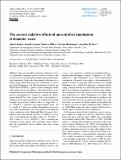| dc.contributor.author | Kodros, John K. | |
| dc.contributor.author | Cucinotta, Rachel | |
| dc.contributor.author | Wiedinmyer, Christine | |
| dc.contributor.author | Pierce, Jeffrey R. | |
| dc.contributor.author | Ridley, David Andrew | |
| dc.date.accessioned | 2017-01-19T20:57:26Z | |
| dc.date.available | 2017-01-19T20:57:26Z | |
| dc.date.issued | 2016-06 | |
| dc.date.submitted | 2016-05 | |
| dc.identifier.issn | 1680-7324 | |
| dc.identifier.issn | 1680-7316 | |
| dc.identifier.uri | http://hdl.handle.net/1721.1/106541 | |
| dc.description.abstract | Open, uncontrolled combustion of domestic waste is a potentially significant source of aerosol; however, this aerosol source is not generally included in many global emissions inventories. To provide a first estimate of the aerosol radiative impacts from domestic-waste combustion, we incorporate the Wiedinmyer et al. (2014) emissions inventory into GEOS-Chem-TOMAS, a global chemical-transport model with online aerosol microphysics. We find domestic-waste combustion increases global-mean black carbon and organic aerosol concentrations by 8 and 6 %, respectively, and by greater than 40 % in some regions. Due to uncertainties regarding aerosol optical properties, we estimate the globally averaged aerosol direct radiative effect to range from −5 to −20 mW m[superscript −2]; however, this range increases from −40 to +4 mW m[superscript −2] when we consider uncertainties in emission mass and size distribution. In some regions with significant waste combustion, such as India and China, the aerosol direct radiative effect may exceed −0.4 W m[superscript −2]. Similarly, we estimate a cloud-albedo aerosol indirect effect of −13 mW m[superscript −2], with a range of −4 to −49 mW m[superscript −2] due to emission uncertainties. In the regions with significant waste combustion, the cloud-albedo aerosol indirect effect may exceed −0.4 W m[superscript −2]. | en_US |
| dc.description.sponsorship | United States. Environmental Protection Agency (STAR program grant 83543801) | en_US |
| dc.description.sponsorship | United States. National Aeronautics and Space Administration (grant NASA NN14AP38G) | en_US |
| dc.language.iso | en_US | |
| dc.publisher | Copernicus GmbH | en_US |
| dc.relation.isversionof | http://dx.doi.org/10.5194/acp-16-6771-2016 | en_US |
| dc.rights | Creative Commons Attribution | en_US |
| dc.rights.uri | http://creativecommons.org/licenses/by/3.0/ | en_US |
| dc.source | Copernicus Publications | en_US |
| dc.title | The aerosol radiative effects of uncontrolled combustion of domestic waste | en_US |
| dc.type | Article | en_US |
| dc.identifier.citation | Kodros, John K., Rachel Cucinotta, David A. Ridley, Christine Wiedinmyer, and Jeffrey R. Pierce. “The Aerosol Radiative Effects of Uncontrolled Combustion of Domestic Waste.” Atmospheric Chemistry and Physics, vol. 16, no. 11, 2016, pp. 6771–6784. | en_US |
| dc.contributor.department | Massachusetts Institute of Technology. Department of Civil and Environmental Engineering | en_US |
| dc.contributor.mitauthor | Ridley, David Andrew | |
| dc.relation.journal | Atmospheric Chemistry and Physics | en_US |
| dc.eprint.version | Final published version | en_US |
| dc.type.uri | http://purl.org/eprint/type/JournalArticle | en_US |
| eprint.status | http://purl.org/eprint/status/PeerReviewed | en_US |
| dspace.orderedauthors | Kodros, John K.; Cucinotta, Rachel; Ridley, David A.; Wiedinmyer, Christine; Pierce, Jeffrey R. | en_US |
| dspace.embargo.terms | N | en_US |
| dc.identifier.orcid | https://orcid.org/0000-0003-3890-0197 | |
| mit.license | PUBLISHER_CC | en_US |
